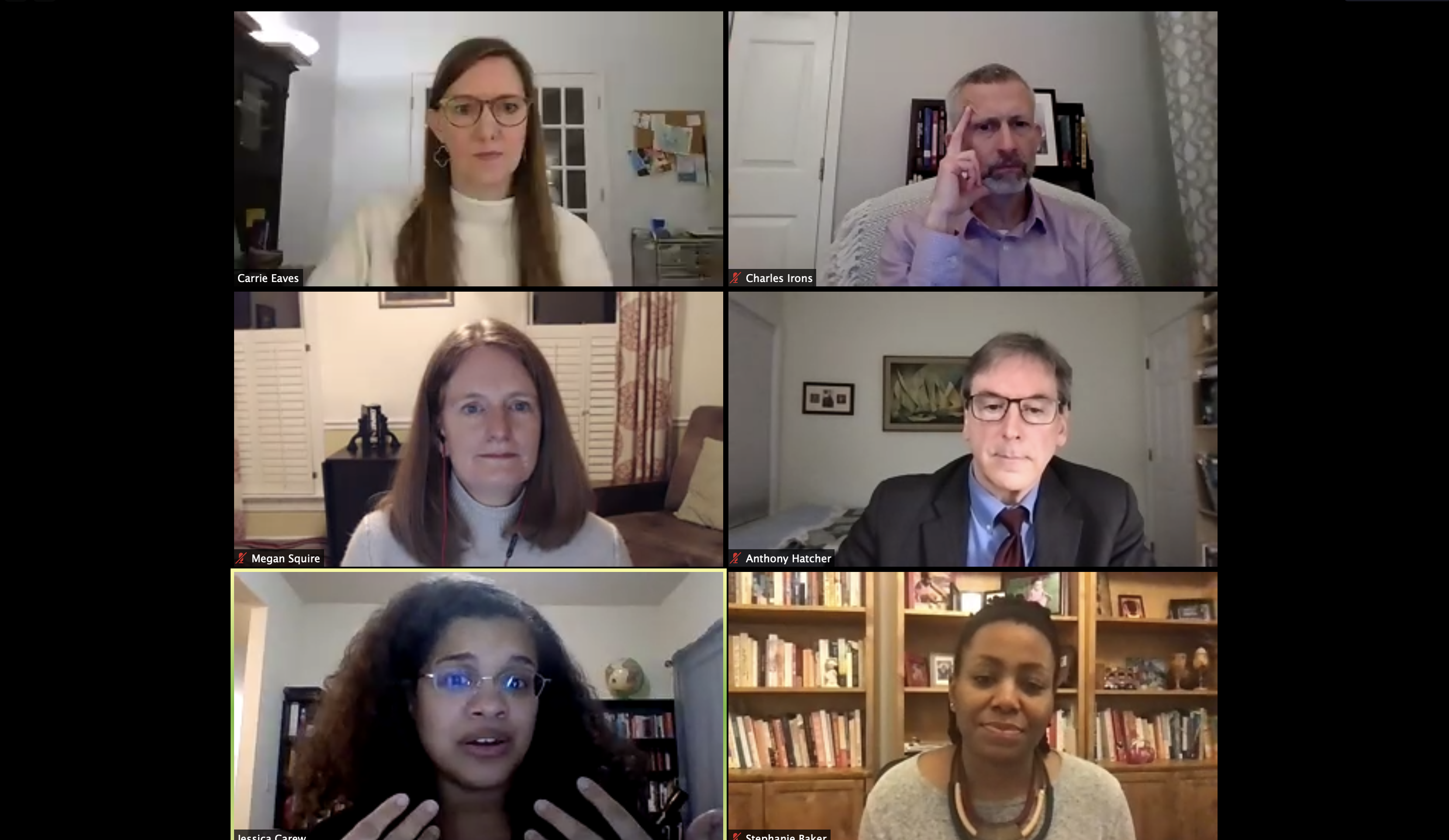Six Elon faculty from a variety of departments discussed the Jan. 6 insurrection at the U.S. Capitol during “Reacting to the Insurrection at the Capitol,” a virtual panel discussion broadcast live to the Elon community on Jan. 15.
With the nation reeling more than a week after the Jan. 6 insurrection at the U.S. Capitol, a panel of Elon faculty dove into a discussion this week about the political, racial and historical significance of the events in Washington, D.C.
On Thursday night, the Elon Council on Civic Engagement invited students, faculty and staff to hear from a panel of faculty experts during “Reacting to the Insurrection at the Capitol.” Carrie Eaves, Faculty Fellow for Civic Engagement and associate professor of political science, moderated the live discussion that touched on a number of topics, including the roles of race, political division, news media and social media in the insurrection.
Faculty expertise spanned across departments and backgrounds as the panel included Stephanie Baker, assistant professor of public health studies; Jessica Carew, assistant professor of political science and policy studies; Anthony Hatcher, professor of journalism; Charles Irons, William J. Story Sr. Professor of History; and Megan Squire, professor of computer science.
Members of the Elon community with a university login and password can view a recording of the discussion here.
During Thursday’s discussion, Carew admitted to being shocked but not surprised as the Jan. 6 events unfolded, saying the build-up to the violence was like “watching a train wreck in slow motion.” Carew pointed to a number of red flags leading up to the event, including years of growing political tension, eroding trust in the political system, and the increased prevalence of an “us vs. them” mentality in America.
“Then we start to expect that this is something that’s going to occur at some point,” Carew said. “When you get some sort of match that’s lit to that tinder, then it’s going to be going up at a very quick time.”
Baker recalled watching the insurrection play out on television with family and was struck by the fact that millions of Americans had the opportunity to see white supremacy in action and in real time. She highlighted the importance of understanding and not downplaying race’s role in the events. Baker specifically pointed to numerous White rioters freely walking out of the Capitol after storming the building.
“Every aspect of it, we have to see it through the lens of race because that’s why it happened the way it happened,” Baker said. “And until we as a society can start to get real about this, it’s going to continue to happen.”
When considering the historical significance of the insurrection and the events leading up to it, Irons discussed the role of white supremacy throughout American history. He brought up the Confederacy, the Wilmington Race Massacre and the Tulsa Race Massacre as instances when white supremacists skewed the meaning of “We the People” to only mean some people. He said that trend continued as white supremacists forced their way into the U.S. Capitol on Jan. 6 in an attempt to overturn the results of the 2020 presidential election.
Related to the election, Irons also touched on the significance of President Donald Trump refusing to concede to President-elect Joe Biden following the presidential race, a tradition that has been honored since the election of 1896.
“The willingness to abide by free and fair elections is definitional to democracy. That’s what it is,” said Irons. “The refusal to concede has consequences.”
For Hatcher, an important takeaway from the U.S. Capitol insurrection was the role of news media and news consumers in the buildup to the violence. He pointed to entertainment-style coverage of Donald Trump’s campaign and presidency, as well as the spread of misinformation, as issues that should be addressed by the news media moving forward. He also called on Americans to become better consumers of news.
“I would hope that we could train ourselves to read outside of our normal media diet, also to read deeply, and to check two or three sources before you decide to pass [a story] on,” Hatcher said.
Squire, who studies right-wing, online extremism, discussed some of the methods alt-right groups used to organize their efforts on Jan. 6. She called the insurrection a symbolic event for white supremacists, who she said had been planning to take action for months and could be using social media to plan future events.
Squire also discussed recently speaking with a congressional subcommittee about online extremism. She told the audience Thursday night that legislators wanted to learn more about the use of social media platforms by extremist groups to help inform future policy decisions related to the issue. Squire explained this could be an encouraging sign for those hoping to see real, positive change in the future.
“This is a moment,” Squire said. “This is a moment when we have a lot of opportunity, so grab on and just dig in.”



